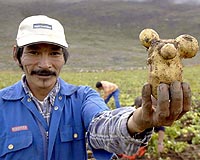| . |  |
. |
Canberra, Australia (UPI) Jul 9, 2009 An Australian-led team of scientists says it has determined the amount of frozen carbon in Earth's northern regions is more than double previous estimates. "We now estimate the deposits contain over 1.5 trillion tons of frozen carbon, about twice as much carbon as contained in the atmosphere", said Charles Tarnocai of Agriculture and Agri-Food Canada, the study's lead author. Pep Canadell, executive director of Australia's Global Carbon Project and study co-author, said the existence of super-sized deposits of frozen carbon means any thawing of permafrost due to global warming might lead to significant emissions of carbon dioxide and methane -- both greenhouse gases. "Radioactive carbon dating shows that most of the carbon dioxide currently emitted by thawing soils in Alaska was formed and frozen thousands of years ago," University of Florida Professor Ted Schuur said. And that, he noted, demonstrates "how easily carbon decomposes when soils thaw under warmer conditions." Canadell said permafrost carbon is a wild card in efforts to predict climate change. He said evidence suggests carbon in permafrost is likely to play a significant role in the 21st century's climate. Carbon in permafrost is found largely in northern regions including Canada, Greenland, Kazakhstan, Mongolia, Russia, Scandinavia and the United States. The research appears in the journal Global Biogeochemical Cycles and was recently published in the journal Nature. Share This Article With Planet Earth
Related Links Climate Science News - Modeling, Mitigation Adaptation
 Global warming impacting Greenlanders' daily lives
Global warming impacting Greenlanders' daily livesNuuk (AFP) July 9, 2009 From his trawler that motors along the Nuuk fjord, fisherman Johannes Heilmann has watched helplessly in recent years as climate change takes its toll on Greenland. Global warming is occurring twice as fast in the Arctic as in the rest of the world. Heilmann, in his 60s with a craggy, rugged face from years of work in the outdoors, says he and his colleagues can no longer take their dogs ... read more |
|
| The content herein, unless otherwise known to be public domain, are Copyright 1995-2009 - SpaceDaily. AFP and UPI Wire Stories are copyright Agence France-Presse and United Press International. ESA Portal Reports are copyright European Space Agency. All NASA sourced material is public domain. Additional copyrights may apply in whole or part to other bona fide parties. Advertising does not imply endorsement,agreement or approval of any opinions, statements or information provided by SpaceDaily on any Web page published or hosted by SpaceDaily. Privacy Statement |